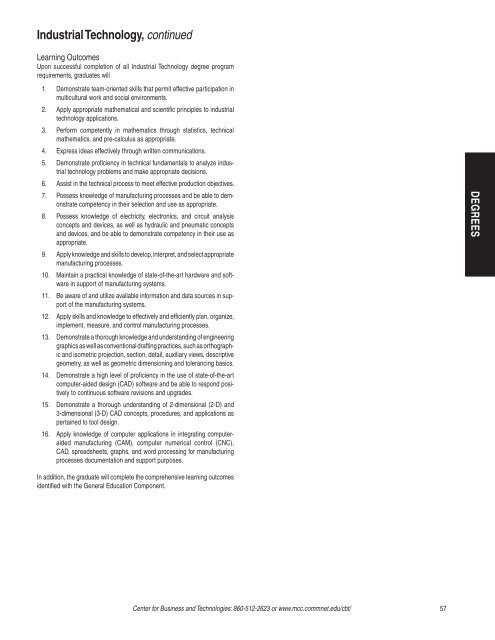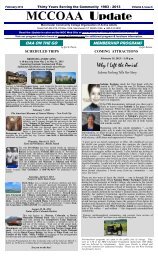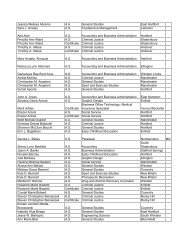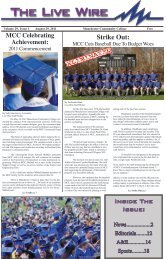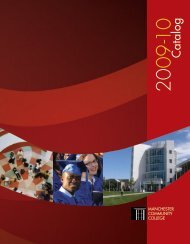Liberal Arts and Science - Manchester Community College ...
Liberal Arts and Science - Manchester Community College ...
Liberal Arts and Science - Manchester Community College ...
Create successful ePaper yourself
Turn your PDF publications into a flip-book with our unique Google optimized e-Paper software.
Industrial Technology, continued<br />
Learning Outcomes<br />
Upon successful completion of all Industrial Technology degree program<br />
requirements, graduates will<br />
1. Demonstrate team-oriented skills that permit effective participation in<br />
multicultural work <strong>and</strong> social environments.<br />
2. Apply appropriate mathematical <strong>and</strong> scientific principles to industrial<br />
technology applications.<br />
3. Perform competently in mathematics through statistics, technical<br />
mathematics, <strong>and</strong> pre-calculus as appropriate.<br />
4. Express ideas effectively through written communications.<br />
5. Demonstrate proficiency in technical fundamentals to analyze industrial<br />
technology problems <strong>and</strong> make appropriate decisions.<br />
6. Assist in the technical process to meet effective production objectives.<br />
7. Possess knowledge of manufacturing processes <strong>and</strong> be able to demonstrate<br />
competency in their selection <strong>and</strong> use as appropriate.<br />
8. Possess knowledge of electricity, electronics, <strong>and</strong> circuit analysis<br />
concepts <strong>and</strong> devices, as well as hydraulic <strong>and</strong> pneumatic concepts<br />
<strong>and</strong> devices, <strong>and</strong> be able to demonstrate competency in their use as<br />
appropriate.<br />
9. Apply knowledge <strong>and</strong> skills to develop, interpret, <strong>and</strong> select appropriate<br />
manufacturing processes.<br />
10. Maintain a practical knowledge of state-of-the-art hardware <strong>and</strong> software<br />
in support of manufacturing systems.<br />
11. Be aware of <strong>and</strong> utilize available information <strong>and</strong> data sources in support<br />
of the manufacturing systems.<br />
12. Apply skills <strong>and</strong> knowledge to effectively <strong>and</strong> efficiently plan, organize,<br />
implement, measure, <strong>and</strong> control manufacturing processes.<br />
13. Demonstrate a thorough knowledge <strong>and</strong> underst<strong>and</strong>ing of engineering<br />
graphics as well as conventional drafting practices, such as orthographic<br />
<strong>and</strong> isometric projection, section, detail, auxiliary views, descriptive<br />
geometry, as well as geometric dimensioning <strong>and</strong> tolerancing basics.<br />
14. Demonstrate a high level of proficiency in the use of state-of-the-art<br />
computer-aided design (CAD) software <strong>and</strong> be able to respond positively<br />
to continuous software revisions <strong>and</strong> upgrades.<br />
15. Demonstrate a thorough underst<strong>and</strong>ing of 2-dimensional (2-D) <strong>and</strong><br />
3-dimensional (3-D) CAD concepts, procedures, <strong>and</strong> applications as<br />
pertained to tool design.<br />
16. Apply knowledge of computer applications in integrating computeraided<br />
manufacturing (CAM), computer numerical control (CNC),<br />
CAD, spreadsheets, graphs, <strong>and</strong> word processing for manufacturing<br />
processes documentation <strong>and</strong> support purposes.<br />
In addition, the graduate will complete the comprehensive learning outcomes<br />
identified with the General Education Component.<br />
Center for Business <strong>and</strong> Technologies: 860-512-2623 or www.mcc.commnet.edu/cbt/<br />
57<br />
DEGREES


